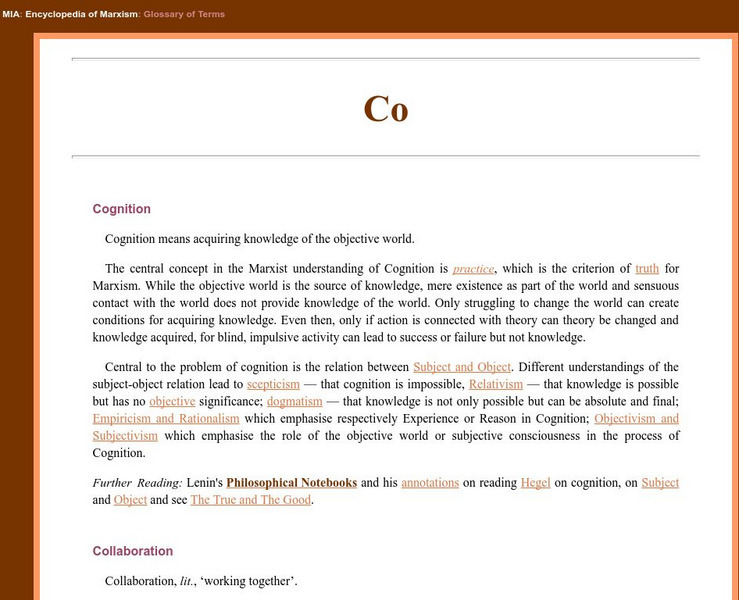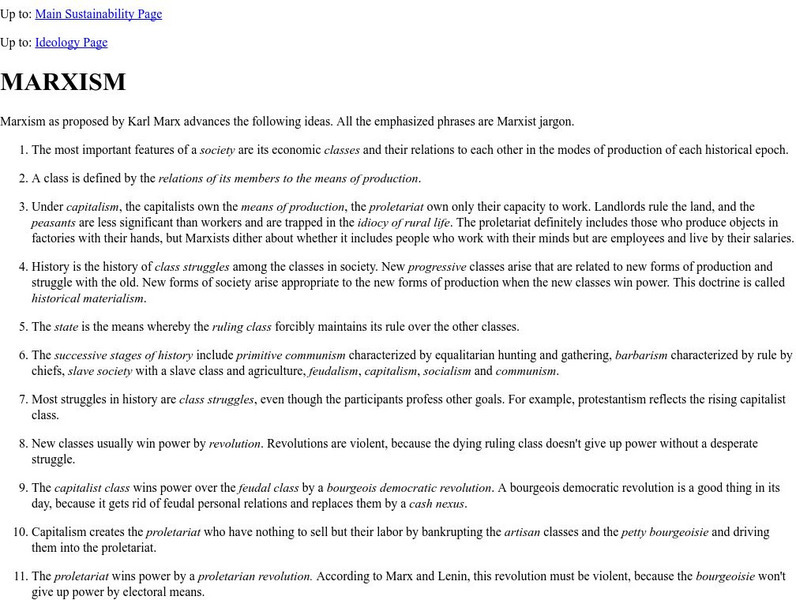Wikimedia
Wikipedia: Human Capital
Learn about the economic concept of human capital, including its origin and similarity to the views of Karl Marx.
Washington State University
Washington State University: Introduction to 19th Century Socialism
This article discusses the origin of 19th-century socialism. Discusses the Enlightenment, Industrial Revolution, social classes, Karl Marx and labor unions. An in-depth article.
Philosophy Pages
Philosophy Pages: Karl Marx (1818 1883)
The life and work of philosopher Karl Marx is surveyed with links to full-text translations of The Communist Manifesto and other tracts.
Blackdog Media
Classic Reader: Author: Karl Marx
This site features the author Karl Marx including the full text of The Communist Manifesto.
Library of Economics and Liberty
The Concise Encyclopedia of Karl Marx(1818 1883 )
This is a synopsis of Karl Marx and communism which focuses on the background and on economics.
Other
Karl Marx's Biography
A biography of Karl Marx, taken from the Granat Encyclopaedia. It includes information on his life, work, and personal references. Contains links to other famous associates and comrades.
Other
Marx's Economic Axioms
Author Henry A. Flynt examines the role of economic products in relation to the philosophies of Karl Marx.
Tom Richey
Theories of Social Stratification: Statements by Marx and Weber
Explains and compares Karl Marx's and Max Weber's theories of social stratification.
Other
Sociology Central:teaching Notes: Social Inequality: Theories: Marxism [Pdf]
Examines Marxist perspectives of social stratification in the contexts of class, gender, and ethnic group stratification. Touches upon modern Marxist theory.
Victorian Web
Brown University: Victorian Web: Karl Marx (1818 1883)
This site provides a detailed biography of Karl Marx. Links to related essays and articles are provided within The Victorian Web. This article is somewhat brief but provides good information on the subject.
SparkNotes
Spark Notes: Social Stratification and Inequality: Theories of Stratification
The theories of social stratification put forward by Karl Marx and Max Weber are explained. The functionalist perspective of Kingsley Davis and Wilbert Moore is also described.
Marxists Internet Archive
Marxists Internet Archive: Communism
Taken directly from the writing of Marx, Engels and Lenin, this entry from the Marxists Internet Archive also includes explanation of the quotations. Very detailed, it will require some sophistication on the part of the reader. Gives an...
Marxists Internet Archive
Marxists Internet Archive: The Principles of Communism
This site from the Marxists Internet Archive provides the Principles of Communism, written by Frederick Engels, defines Proletariats in the second section of this page. Defines proletarianism, and then answers more detailed questions...
Stanford University
Stanford University: Marxism
Lengthy explanation of the views expressed by Marx. Covers his thoughts on production and the means of production, class struggles, the bourgeoisie and the proletariat, and what he saw as a possible end to the conflict - what some call...
Lumen Learning
Lumen: Boundless Sociology: Sociological Theories and Global Inequality
Explains sociological theories and global inequality.
CommonLit
Common Lit: Book Pairings: "Black Boy" by Richard Wright
Richard Wright, a black boy living in the Jim Crow South, travels north in hopes of escaping the violence and prejudice that rules his childhood. Selected (8) reading passages (grades7-12) to pair with "Black Boy" by Richard Wright....
Purdue University
"Terms Used by Marxism." Introductory Guide to Critical Theory, by Dino Feluga
Marxist terms that are presented in alphabetical order; however, someone beginning to learn Marxism and neo-Marxism needs to stay conscious of the fact that each major theorist uses particular terms in his or her particular way.
Robin Chew
Lucidcafe: Karl Marx
A short introduction to the German economic and political philosopher, Karl Marx. Includes links to other sites about Marx, as well as links to books by or about Marx.
Wikimedia
Wikipedia: Proletariat
Wikipedia offers the definition of the Proletariat, the working class as defined by the Romans and by in Marxist theory.
Blackdog Media
Classic Reader: The Communist Manifesto by Karl Marx
Read the full text of one of the world's most influential political documents "The Communist Manifesto" by Karl Marx.
McMaster University
Mc Master University: Karl Marx
This site from the McMaster University is an excellent site to explore selected works by Karl Marx. It includes a picture of Marx along with hyperlinks to online versions of selected works.
Marxists Internet Archive
Marxists.org: Proletariat
View Karl Marx's definition of what the proletariat is. Also information on its origins and a discussion on the issues that need to be examined in relation to Marx's definition is given.
Ducksters
Ducksters: The Cold War for Kids: Communism
Kids learn about the history of Communism and the Cold War. Karl Marx, Lenin, and Mao were world leaders over communist countries.
Marxists Internet Archive
Marx/engels Biography: "Karl Marx", by Friedich Engels
This short biography is based on the original 1868 German written by Marx's collaborator, Friedrich Engels.






















